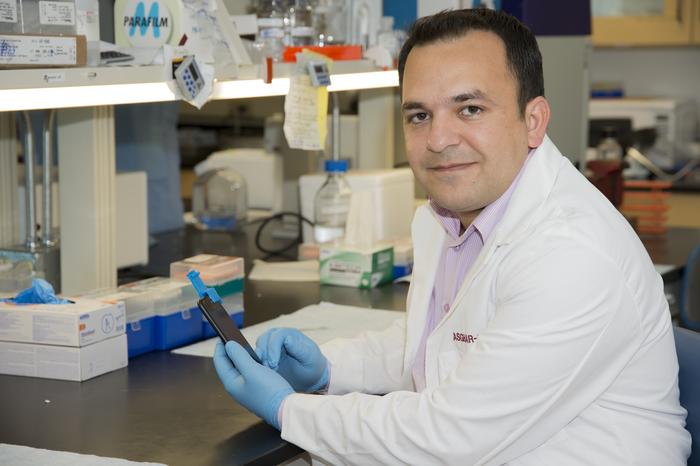Researchers at Florida Atlantic University (FAU) are undertaking a significant breakthrough in addressing the urgent healthcare need for improved HIV testing. With nearly 40 million individuals living with HIV worldwide and many unbeknownst to their status, tackling the pandemic requires innovative solutions that can provide effective diagnostics. Traditional methods are often expensive and cumbersome, leaving gaps in both patient awareness and treatment accessibility. The FAU team, led by Dr. Waseem Asghar, is developing an innovative self-testing platform that shows promise to change the landscape of HIV diagnostics and patient care.
As of the end of 2023, the statistics surrounding HIV and AIDS remain alarming. Approximately 1.2 million people in the United States are living with the virus, and globally, about 630,000 individuals succumbed to AIDS-related ailments that year. Despite advancements in antiretroviral therapy (ART), which have significantly enhanced life expectancy for those diagnosed, barriers exist that limit effective treatment, particularly in resource-limited settings. Key among these is the difficulty of diagnostics during the crucial acute infection phase, where timely detection can greatly influence treatment outcomes.
One of the central problems hindering progress is that a considerable percentage of those living with HIV remain unaware of their infection status. It is estimated that about 25% of individuals living with HIV do not know they have it, which poses risks for both their health and public health at large. Furthermore, among those receiving ART, the potential for viral rebound—when the viral load increases between test intervals—remains a critical concern. Patients may unknowingly become infectious again, underscoring the need for more frequent and accessible testing methods.
The solution devised by the FAU researchers includes a disposable microchip technology aimed at self-testing for HIV-1 during the crucial first two weeks following infection. This prototype is not only innovative but also aligns with a broader public health approach since it could be adapted for other infectious diseases, including malaria, tuberculosis, and various viral infections. The project has garnered attention and funding, receiving a five-year, $1.3 million grant from the National Institutes of Health’s National Institute of Allergy and Infectious Diseases, highlighting its potential impact.
Dr. Asghar explains that the current landscape of HIV testing is often financially prohibitive and complicated by technical requirements. Many existing tests necessitate skilled personnel, expensive laboratory equipment, and stringent transportation and storage protocols, making them impractical for at-home use. This lack of accessible self-testing devices contributes to the ongoing challenges in identifying and managing HIV infections adequately.
The anticipated cost of the FAU’s new technology is less than $5 per test, which represents a significant reduction compared to current testing methods that can range from $50 to over $200. Another notable aspect of the new test is its anticipated ease of use. Unlike traditional tests that often require clinical intervention and multiple handling instructions, this handheld device will provide users with a truly automated solution: “sample-in-answer-out”. This system minimizes user error and facilitates rapid results within an impressive 40 minutes, a substantial improvement over conventional methods needing several hours or even days for results.
Leveraging advanced technologies in microchip fabrication, microfluidics, isothermal amplification, imaging, and microelectronics, the FAU project team aims to establish a streamlined approach to HIV-1 self-testing. The envisioned testing chip will enable accurate detection of the virus from whole blood samples, addressing an urgent need for both early diagnosis of acute infections and monitoring of potential treatment failures among individuals receiving ART.
Dr. Massimo Caputi, fellow investigator on the project and a professor in the Department of Biomedical Science, emphasizes that the assay will be robust enough to deliver rapid results while ensuring stability without refrigeration—overcoming yet another barrier present in traditional testing protocols. This combination of innovation and practicality positions the FAU project as a potential game changer in diverse healthcare settings, particularly in underserved regions lacking sufficient health infrastructures.
Critically, the team anticipates that the portability and low-cost attributes of the new device will empower individuals to take control of their health, thus enhancing public health outcomes. By facilitating early detection of HIV, the technology can help reduce transmission rates while also improving the likelihood of successful long-term treatment and health management. The ability to monitor viral load between tests provides necessary information to healthcare providers, enabling timely interventions when irregularities occur.
The urgency of this research is further echoed by Dr. Stella Batalama, dean of the College of Engineering and Computer Science at FAU. She articulates that providing an affordable and effective platform for self-testing could greatly impact those in impoverished areas where healthcare access is limited. If widely adopted, such technology has the potential to transform not only individual health prospects but also broader community dynamics concerning HIV awareness and treatment.
Collaboration is a key element in the success of the project, with additional expertise brought in from clinicians specializing in pathology and infectious diseases. This multi-disciplinary approach ensures that the development of the self-test adheres to clinical standards and responds to real-world challenges faced by patients and healthcare providers alike.
In conclusion, the innovative program being developed at FAU signifies not just a technical advancement, but a step forward in global public health strategies against HIV and other infectious diseases. With its potential for widespread application, the new self-testing technology could reshape the approach to health surveillance, diagnosis, and treatment—empowering both individuals and communities in the fight against HIV. The project stands as an exemplar of how academic research can intersect with pressing societal needs, tailored to promote health equity and accessibility.
Subject of Research: Development of affordable self-testing technology for HIV detection.
Article Title: FAU Researchers Innovate Affordable Self-Testing Technology for HIV Detection
News Publication Date: [Add Date Here]
Web References: [Add Any Relevant Links Here]
References: [Add Any Cited Literature Here]
Image Credits: Credit: Alex Dolce, Florida Atlantic University
Keywords
Infectious Diseases, HIV Infections, Virus Testing, Acute Infections, HIV Treatments, HIV Research.




